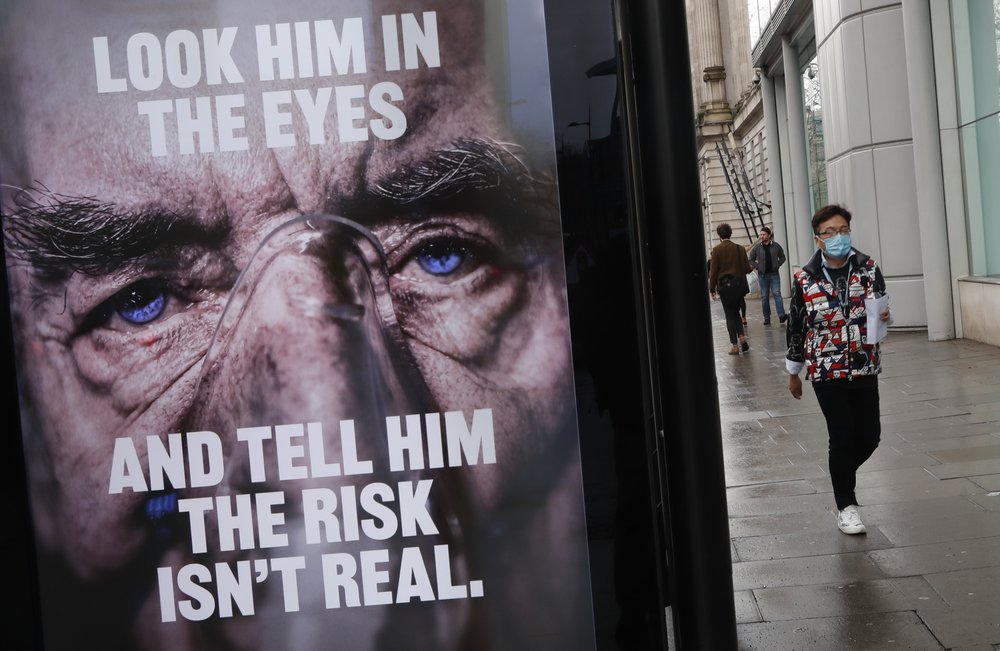A man wearing a mask against coronavirus walks past an NHS advertisement about COVID-19 in London, Tuesday, Feb. 2, 2021. British health authorities plan to test tens of thousands of people in a handful of areas of England in an attempt to stop a new variant of the coronavirus first identified in South Africa spreading in the community. The Department of Health says a small number of people in England who had not travelled abroad have tested positive for the strain. (AP Photo/Alastair Grant)
LONDON (AP) — Britain’s health chief said Wednesday that a new study suggesting that a single dose of the Oxford-AstraZeneca COVID-19 vaccine provides a high level of protection for 12 weeks supports the government’s strategy of delaying the second shot so it can protect more people quickly with a first dose.
Britain’s decision has been criticized as risky by other European countries, but Health Secretary Matt Hancock said the study “backs the strategy that we’ve taken and it shows the world that the Oxford vaccine works effectively.”
Hancock’s comments came after Oxford University released a study showing the vaccine cut transmission of the virus by two-thirds and prevented severe disease.
Mene Pangalos, executive vice president of biopharmaceuticals research and development at AstraZeneca, said no patients experienced severe disease or hospitalization three weeks after receiving a first dose, and that efficacy appeared to increase up to 12 weeks after the initial shot.
“Our data suggest you want to be as close to the 12 weeks as you can” for the second dose, he told a news conference.
The study has not been peer-reviewed yet and does not address the efficacy of the Pfizer-BioNTech vaccine, the other one currently in use in the U.K. Pfizer recommends that its shots be given 21 days apart and has not endorsed the U.K. government’s decision to lengthen the time between doses.
But the Oxford research was greeted with excitement by U.K. officials under pressure to justify their decision to delay the second dose.
“That reduction in transmission, as well as the fact there is no hospitalizations, the combination of that is very good news. And it categorically supports the strategy we’ve been taking on having a 12-week gap between the doses,” Hancock told Sky News.
Some countries, including France, have authorized the AstraZeneca vaccine only for use in people under 65, saying there is not enough evidence to say whether it works in older adults. Belgium has authorized it only for people 55 and under.
Yet one of the lead researchers on the Oxford vaccine project, Dr. Andrew Pollard, said “we expect it to be highly effective in older adults” and said more data should be available in the next few weeks.
Britain has Europe’s deadliest coronavirus outbreak, with more than 108,000 deaths, and is in its third national lockdown as authorities try to contain a new, more transmissible virus variant first identified in southeast England.
Other variants are also a concern. Public health officials in England are going door to door, trying to test all adults in eight targeted communities in an attempt to stop a new strain first identified in South Africa from spreading further.
So far 105 cases of the variant have been identified in the U.K., 11 of them in people with no links to overseas travel. Scientists say there’s no evidence the South African variant is more serious than the original virus but it may be more contagious. There are also concerns that current vaccines may be less effective against that variant because it contains a mutation of the virus’ characteristic spike protein that existing vaccines target.
That is a worry as the U.K. races to vaccinate its own population against the virus. Almost 10 million people have received the first of their two shots, including the bulk of people over 80 and those in nursing homes.
Pollard said Oxford scientists believe the AstraZeneca vaccine will continue to offer protection against new variants of COVID-19, although they are still waiting for data on that.
He said even if the virus adapts “that doesn’t mean that we won’t still have protection against severe disease.”
“If we do need to update the vaccines, then it is actually a relatively straightforward process. It only takes a matter of months, rather than the huge efforts that everyone went through last year to get the very large-scale trials run,” he told the BBC.
Copyright 2020 Associated Press. All rights reserved.
Source: https://apnews.com/article/health-coronavirus-pandemic-53c40e579c3209a77ffc6ca798aff1a7









































